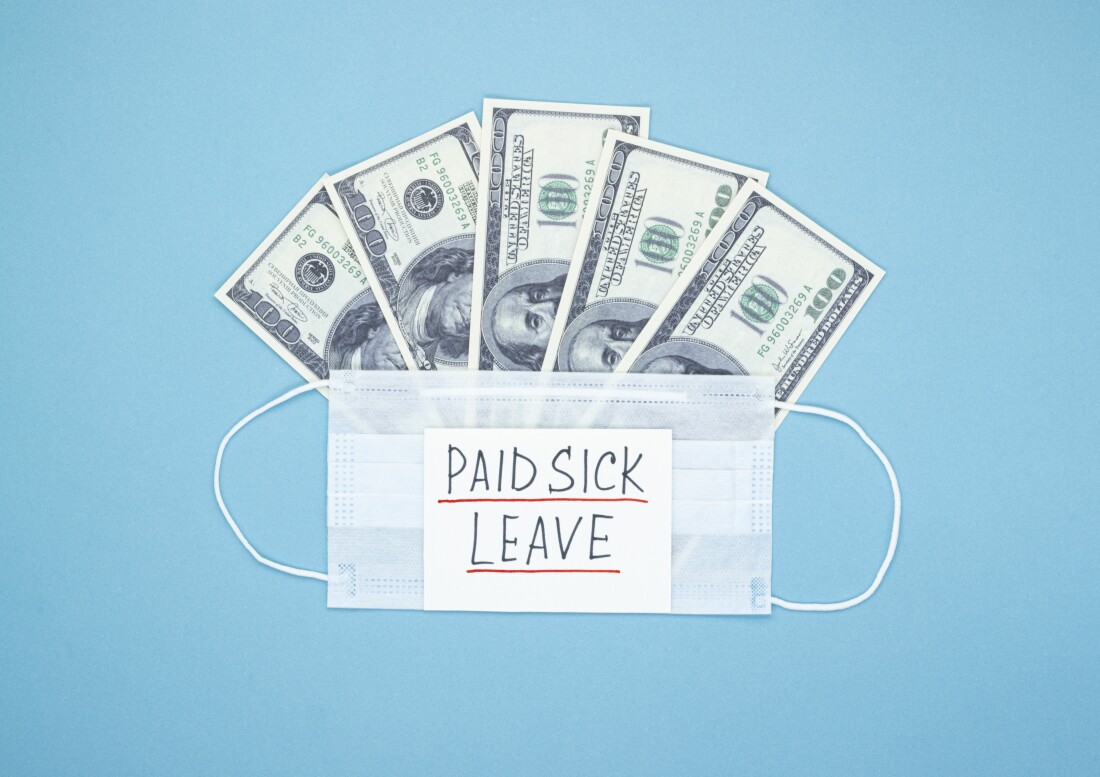Showing 22 posts in Workers' Compensation.
Court of Appeals Rules: Employee Fraud was Never a Condition for Recoupment Action
 The Michigan Court of Appeals recently issued an opinion discussing the retroactivity of a prior opinion regarding the right of employers and insurance carriers to seek recoupment of benefits overpaid to an injured worker in the absence of fraud by the worker. Norman Carson v Bandit Industries Inc and Acuity Mutual Insurance Co, __ Mich App _ (2020). Read More ›
The Michigan Court of Appeals recently issued an opinion discussing the retroactivity of a prior opinion regarding the right of employers and insurance carriers to seek recoupment of benefits overpaid to an injured worker in the absence of fraud by the worker. Norman Carson v Bandit Industries Inc and Acuity Mutual Insurance Co, __ Mich App _ (2020). Read More ›
Categories: Fraud & Abuse, Insurance, Legislative Updates, Workers' Compensation
COVID-19 Related Paid Leave Tax Credits Extended Into 2021
 The federal government enacted the Families First Coronavirus Response Act (“FFCRA”) on March 18, 2020. The FFCRA was intended to provide support to workers who were unable to work while complying with government-mandated quarantines following exposure to COVID-19 or while taking care of someone else in quarantine. The law required employers with fewer than 500 employees (“covered employers”) to pay certain employees Emergency Paid Sick Leave, Emergency Family Medical Leave and/or Expanded Emergency Family and Medical Leave (together, “FFCRA Leave”) as more fully described below. Read More ›
The federal government enacted the Families First Coronavirus Response Act (“FFCRA”) on March 18, 2020. The FFCRA was intended to provide support to workers who were unable to work while complying with government-mandated quarantines following exposure to COVID-19 or while taking care of someone else in quarantine. The law required employers with fewer than 500 employees (“covered employers”) to pay certain employees Emergency Paid Sick Leave, Emergency Family Medical Leave and/or Expanded Emergency Family and Medical Leave (together, “FFCRA Leave”) as more fully described below. Read More ›
Categories: COVID-19 and Workers' Compensation, Employee Benefits, Employment, Workers' Compensation
Appeals Court Rejects Comp Benefits in ‘Special Mission’ Case
 On December 17, 2020, in an unpublished per curium decision, the Michigan Court of Appeals reversed an award of workers' compensation survivor’s benefits that had been given to a widow whose spouse had been killed while he was traveling to a class the employer had encouraged him to attend and for which the employer had paid pursuant to its employee education assistance and tuition reimbursement program. See Lewis v LexaMar Corp, Mich App __ (2020). Read More ›
On December 17, 2020, in an unpublished per curium decision, the Michigan Court of Appeals reversed an award of workers' compensation survivor’s benefits that had been given to a widow whose spouse had been killed while he was traveling to a class the employer had encouraged him to attend and for which the employer had paid pursuant to its employee education assistance and tuition reimbursement program. See Lewis v LexaMar Corp, Mich App __ (2020). Read More ›
Categories: Case Law Updates, Employment, Workers' Compensation
The Safeguarding America's First Responders Act - New Federal Law Provides Access to Death Benefits Program for Families of Public Safety Officers who Die as a Result of COVID-19
 There have been nearly seven million confirmed COVID-19 cases in the United States, with over 200,000 confirmed deaths. In Michigan alone, there have been over 130,000 confirmed cases and roughly 7,000 confirmed deaths. Certain employees working in the health field, including first responders, have been impacted significantly by COVID-19.
There have been nearly seven million confirmed COVID-19 cases in the United States, with over 200,000 confirmed deaths. In Michigan alone, there have been over 130,000 confirmed cases and roughly 7,000 confirmed deaths. Certain employees working in the health field, including first responders, have been impacted significantly by COVID-19.
In a previous article, we discussed the Emergency Rules and Executive Orders promulgated by Governor Gretchen Whitmer, creating a rebuttable presumption that COVID-19 is a personal injury arising out of and in the course of employment for first response employees. Read More ›
Categories: COVID-19 and Workers' Compensation, Legislative Updates, Workers' Compensation
Are Death Benefits Owed When an Employee Dies after Contracting the Coronavirus?
 The Context
The Context
There have been over 40,000 confirmed COVID-19 cases in Michigan. This figure includes over 4,000 deaths. We are currently averaging about 1,000 new cases and 100 new deaths per day. Fortunately, the curve is flattening and some areas of the state have seen decreases. Read More ›
Categories: COVID-19 and Workers' Compensation, Employee Benefits, Workers' Compensation
The Anticipated Rise in At-Home Work Injury Claims During the Coronavirus Pandemic
 The Context
The Context
We remain in the midst of a worldwide pandemic. The federal government and all 50 states have declared states of emergency. In an effort to mitigate the rapid spread of the coronavirus, Governor Gretchen Whitmer issued a “Stay Home, Stay Safe” Executive Order on March 24, 2020 (EO 2020-21). That Order was rescinded and superseded by another expanded stay-at-home Order, issued on April 8, 2020. (See EO 2020-42). Earlier this morning, the governor issued her most recent Stay Home, Stay Safe Order, extending the stay-at-home decree until May 15, 2020. (See EO 2020-59). Read More ›
Categories: COVID-19 and Workers' Compensation, Workers' Compensation
Is an Employee Injured before December 19, 2011 Obligated to look for Work?
 The Supreme Court of Michigan recently issued a decision addressing a plaintiff’s obligation to make a good faith job search where the injury arose prior to the 2011 amendments to the Worker’s Disability Compensation Act. Bell v. City of Saginaw. Plaintiff Bell was injured in the course of his employment on October 16, 2011. Benefits were voluntarily paid from the date of injury until his return to work. He subsequently went back off when he failed his fitness for duty physical. Workers’ compensation benefits were not reinstated and plaintiff filed suit. To read more about this case and its implications, see full article here.
The Supreme Court of Michigan recently issued a decision addressing a plaintiff’s obligation to make a good faith job search where the injury arose prior to the 2011 amendments to the Worker’s Disability Compensation Act. Bell v. City of Saginaw. Plaintiff Bell was injured in the course of his employment on October 16, 2011. Benefits were voluntarily paid from the date of injury until his return to work. He subsequently went back off when he failed his fitness for duty physical. Workers’ compensation benefits were not reinstated and plaintiff filed suit. To read more about this case and its implications, see full article here.
Categories: Case Law Updates, Workers' Compensation
Appeals Court: J-1 Visa Employee at MSU Ineligible for Workers' Compensation
 In May 2019, the Michigan Court of Appeals decided Kuhlbert v Michigan State University. This case examines several interesting workers' compensation issues which we will analyze in a three-part series. Today, we discuss the case’s complicated facts and procedural history, and whether the plaintiff should be considered an “employee” pursuant to Michigan’s Workers' Disability Compensation Act (the “Act”). For more on the facts surrounding this case, see full article here.
In May 2019, the Michigan Court of Appeals decided Kuhlbert v Michigan State University. This case examines several interesting workers' compensation issues which we will analyze in a three-part series. Today, we discuss the case’s complicated facts and procedural history, and whether the plaintiff should be considered an “employee” pursuant to Michigan’s Workers' Disability Compensation Act (the “Act”). For more on the facts surrounding this case, see full article here.
Categories: Case Law Updates, Workers' Compensation
Employee or Independent Contractor? The Appellate Commission Applies its Own Facts to Overturn Magistrate’s Decision
 In July 2019, the Michigan Compensation Appellate Commission (“the Commission”) issued an Opinion in the case of Christopher Parshall v Worden & Company, Inc. In Parshall, the Commission reversed the magistrate’s factual determination that Mr. Parshall was an independent contractor and not an employee as defined by the Workers’ Disability Compensation Act (“Act”).
In July 2019, the Michigan Compensation Appellate Commission (“the Commission”) issued an Opinion in the case of Christopher Parshall v Worden & Company, Inc. In Parshall, the Commission reversed the magistrate’s factual determination that Mr. Parshall was an independent contractor and not an employee as defined by the Workers’ Disability Compensation Act (“Act”).
Categories: Case Law Updates, Workers' Compensation
What is a Good-Faith Job Search Effort? Michigan Legislature Considers New Bill
MCL 418.301(5) sets forth the four requirements a claimant must satisfy in order to qualify for workers' compensation wage loss benefits. The claimant must:
- Disclose his qualifications and training,
- Provide a list of jobs he is qualified and trained to perform within the same salary range as the job at which he was injured,
- Demonstrate that the work-related injury prevents him from performing the jobs he identified as within his qualifications and training that pay maximum wages, and
- If he is capable of performing any of the jobs within his qualifications, he must demonstrate that he cannot obtain any of those jobs by showing a good-faith attempt to procure post-injury employment.
When analyzing the fourth element, how does a magistrate determine what is and what is not a good-faith job search effort? For more on what constitutes a good faith job search effort, see full article here.
Categories: Legislative Updates, Workers' Compensation



 Share
Share